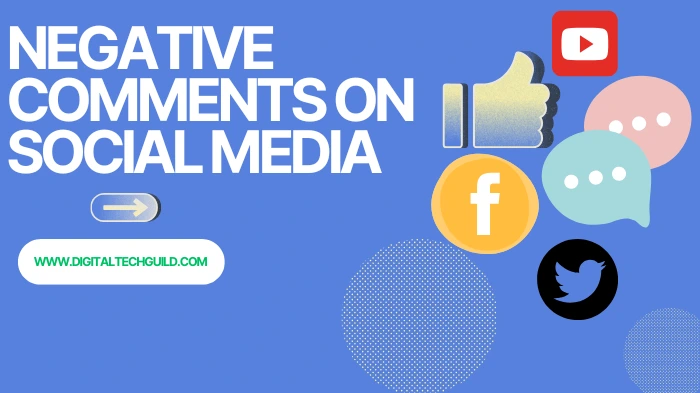It appears that no business is immune to unfavorable remarks on social media, regardless of the kind of business you operate or how successfully you manage it. Negative comments on social media these comments provide excellent chances to reply to your audience in a way that they will value and be impressed by, regardless of whether it's a troll attempting to stir up trouble or sincere criticism about a bad customer experience.
But first, take into account the following suggestions from the Forbes Communications Council's marketing and communications gurus to make sure you're being successful and efficient. Here, they each provide their best advice and personal procedures for handling unfavorable comments on social media and keeping a favorable online reputation for their brands.
Top 13 Tips For How To Handle Negative Comments On Social Media
1. Make use of an automated review monitoring system.

We take a very systematic approach to negative feedback. In order to receive immediate notice of such reviews or feedback, we employ an automatic review tracking technology.
We can quickly resolve problems with this system, including spotting and removing phony negative ratings. In order to preserve brand integrity, key teams are working together in a coordinated effort rather than acting on an as-needed basis.
Read also: Lean Software Development
2. Express gratitude, acknowledge, and evaluate
In each circumstance, when someone provides feedback, recognize it, show gratitude, and then determine whether it calls for adjustments.
Feedback response methods must engage a variety of stakeholders because of the prevalence of cancellation culture and the increased stringency of regulatory compliance.
By cultivating an accountability culture, teams can respond swiftly and elegantly, particularly when time is critical.
3. Consider every criticism as a gift.
Feedback is present. Consider what responders say about the brand since most are interested or concerned. Usually, we reply on social media and provide them a simple method to get in touch with us so that we can have a more in-depth conversation about the matter via a private, secure channel.
4. Create Best Practices Guidelines
Establishing a procedure with rules for social media administrators regarding which comments to reply to or flag is crucial. Best practices for identifying what constitutes a negative comment and any possible repercussions serve as the foundation for our rules.
After that, pre-planned, strategic language is used based on the analysis. If it is found that the remark negatively affects the brand, it is forwarded to me for further handling.
Read also: Boost Your Engagement: Essential Social Media Marketing Trends for 2024
5. Pay special attention and act fast.

Our social media profiles are part of our company-wide hypercare program. To ensure that no consumer (or commenter) ever needs to wait to feel heard, we monitor seven days a week and reply within twenty-four hours.
After that, we start working on fixing the problem. We respond to a single public remark before moving it to a more private setting, such as the phone or email. We view criticism as an opportunity to do better.
6. Adhere to the Five W's
My strategic filter consists of the five W's. Who provided the criticism? What do they intend to do? Why do people feel angry or upset? How frequently and when did they submit feedback?
Which outlets did they use to convey their opinions? We can make far more precise decisions about how to respond if we evaluate the input. We try to find out more if we don't know.
7. Take the unfavorable comments down.
To reduce the possibility that unfavorable comments may gain traction on social media, it is best to immediately shift it offline (that is, via direct messages, emails, or phone calls).
In particular, we promptly reply to the feedback that has been provided by sincerely apologizing for their experience and asking them to direct message us with their name and contact details so that we may investigate the issue and get in touch with them.
8. Customize Your Answer
In my experience, responding to unfavorable comments on social media calls for a quick, tailored, and calculated strategy.
We place a high value on prompt, courteous answers to demonstrate our attention, but only after carefully considering the context of each comment in order to customize our response.
In order to preserve public openness and confidentially resolve individual issues, our customer support representatives seek to move the conversations offline.
9. Apply the HEARD Method
I would advise utilizing the HEARD approach, which is widely used in the hospitality sector but can be applied to other sectors as it serves as a broad framework for efficiently handling complaints.
Listen to your customer respectfully, show genuine care, provide an apology if necessary, fix the problem, and assess the circumstances to identify the root of the issue and stop it from happening again.
10. Put in Place A Simple Procedure.

Companies have to set up a procedure for handling unfavorable reviews. Would you want to discuss it in the comments section? Please reply with an email requesting further details on the issue.
In these circumstances, you must adhere to your process in order to proactively handle the feedback and, most importantly, communicate to the customer that their voice is being heard.
11. Create Materials to Support Your Team's Effective Reaction
Managing social media communities may be a brand's secret weapon. Teams may use it to resolve complaints, maintain customer satisfaction, and safeguard the reputation of their company.
FAQs that are written in the voice of the brand are like your reliable foundation; they develop naturally over time. Social teams can better anticipate, mitigate, and handle concerns with the aid of a response matrix that is also in line with the brand's voice.
12. Assign a group to manage timely reactions.
Understanding the need for timely answers to avoid escalation, we have a dedicated staff that keeps an eye on all reviews and reacts to them within 48 hours.
Following the initial reaction, we make sure the local market has the relevant information for individualized care. Review insights inform ongoing enhancements with the goal of anticipating and averting future occurrences of the same problems.
13. Promote Participation While Eliminating Trolls
Negative reviews should be handled by a business using a uniform procedure that promotes genuine interaction and weeds out trolls. While unsubstantiated negative comments may be censored or removed to preserve a positive community environment, genuine complaints should be handled quickly and professionally by a dedicated staff.
Read also: Dominate 2024 Social Media: Top Tools Every Business Needs
The top 5 tools for review management that users may utilize

Let's move on to discussing internet marketing solutions that can help you deal with unfavorable reviews and comments.
1. Brandwatch
Make use of this tool to track online mentions of your brand. Utilize analytical capabilities to track brand exposure in real time, identify sentiment shifts, and comprehend consumer impressions. For information that better suits your approach, you may also look at these Brandwatch substitutes.
2. Google Alerts
Google Alerts is a terrific choice to take into consideration if you're searching for a free service with basic functionality that lets you keep an eye on mentions. You may use it to examine what credible websites have to say about your competitors and to keep an eye out for unfavorable remarks on social media.
3. Ahref
Ahref is a multipurpose SEO tool that may be used to track brands. Ahref's notifications are more successful than Google's. Therefore, I would advise you to utilize this tool if you are not on a tight budget.
4. The Social Pilot
For social media experts and agencies, this technology is the ideal answer. You can schedule and post on social media from a single location using SocialPilot. Better tracking of both positive and negative reviews is another benefit.
5. The study of
Do not hesitate to utilize our internet service if you have trouble writing responses to unfavorable remarks. Expert writers from Studicus can assist you in handling unfavorable evaluations.
Conclusion on Negative Comments On Social Media
Keep in mind that, if handled properly, critical remarks are not a major issue. Every day, multinational corporations receive dozens of negative assessments, yet this has little impact on their earnings. Their achievement has a straightforward explanation. They are skilled at handling irate clients.
Therefore, monitor what people are saying about your brand on social media if you want your business to be successful. Respond to every remark you get. Pay attention to your consumers' issues. And nothing will prevent you from getting the outcomes you've been hoping for.
FAQ's: Negative Comments On Social Media
How to handle negativity in social media?
Take a break if the negativity is getting to you. Mute or conceal users, unfollow accounts that are favorable, and follow ones that are negative. Maintaining one's mental health is crucial. Look for opportunities to act on social media without getting acted upon.
How to reply to haters on social media?
Saying thank you for sharing or I appreciate your opinion is sufficient if you believe someone is only trying to be heard. Say something like thanks for sharing or we all have our perspectives if you believe someone is trying to be a backhanded hater, or simply remove the remark and move on.
How to deal with mean comments on social media?
- Don't take it personally. It's easy to get defensive when someone says something negative about you or your work.
- Respond promptly, if necessary. The sooner you respond to a negative comment, the better.
- Be respectful.
- Apologize if necessary.
- Report abuse.
How do you deal with toxic social media?
If you no longer wish to view any of their posts or comments, block them. Unfriending someone may be the only method to cease viewing their postings if you're on a social networking platform other than Facebook.
What is the psychology behind negative comments?
People may transfer their frustrations or insecurities onto others by making disparaging remarks. They could believe that by criticizing others, they are drawing attention away from own problems.











.jpg)